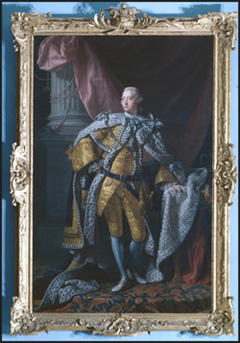Confronting an Empire

Portrait of George III
Despite the fervor of colonial opposition to the Townshend Duties, and the great strides made toward collective action through non-importation agreements and legislative coordination, news of the repeal of most of the duties made the windspeed of colonial resistance drop considerably. By July 1771, all of the non-importation associations had disintegrated. Even with Boston radicals circulating propaganda to foment outrage, news of the Boston "Massacre" in March 1770 failed to generate much sustained reaction outside of New England. Something approaching normalcy, or at least a demonstrable desire to seek it out, seems to have settled on British America.
That all began to change in 1772. A major transatlantic credit crisis drove imperial commerce into a tailspin, sinking a number of major merchant houses and exacerbating colonial concerns over their economic relationships with Great Britain. Moreover, the British ministry's reaction to the June 1772 burning of the Gaspée—a warship employed to enforce the Revenue Acts on the coast of New England—spurred the revolutionary movement by driving colonials to create the first sustained steps to American union through the creation of the intercolonial committees of correspondence.
The spark that transformed a revolution in hearts and minds of British Americans into outright confrontation was struck on May 10, 1773, with Parliament's passage of the Tea Act. It was intended by the North administration to bail out the East India Company by granting it a monopoly to sell its 18,000,000 pounds of surplus tea in the colonial market at vastly reduced prices. Boston radicals, however, reacted by dumping a considerable consignment of the tea into the harbor on December 16, 1773. Given the antipathy of many colonials—especially those in Virginia and the other southern colonies—toward Massachusetts Bay, the Boston Tea Party might have gone the way of the Boston "Massacre," causing little concern as yet another intemperate move by New England radicals. Even radicals in other colonies were outraged at the lawless destruction. Lord North, however, took an unprecedented step by turning the entire matter over to Parliament to handle, which transformed a criminal action into a matter of constitutional principle.
The result was the Coercive Acts, passed in the spring of 1774, the first and most important of which closed Boston's port and revoked the colony's charter. It was major tactical miscalculation for North and others to believe that the rest of the colonies would leave Massachusetts Bay to its fate. Instead, it drove them together. George Washington probably put it best when he wrote, "The cause of Boston, the despotick Measures in respect of it, now is and ever will be the cause of America." More importantly, it led to the creation of the First Continental Congress, which convened in Philadelphia, and the first steps toward the founding of an independent American state.








